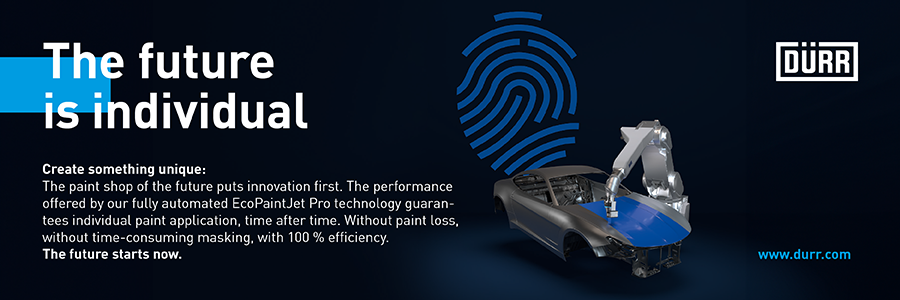
The Dürr Group continues to expand its range in the growth business of production technology for battery electrodes to include efficient and sustainable future-oriented technology.
Dürr Systems AG plans and implements turnkey painting and final assembly systems as well as machine and robot technology from a single source for the automotive industry worldwide.
In September 2022 Manz, GROB-WERKE, and Dürr announced they were entering into a European partnership in the field of production technology for lithium-ion batteries.
In November 2023 the company acquired the French mechanical engineering company Ingecal, which expanded its range to include calendering systems to the battery industry.
These play a key role in the coating of electrode foils for lithium-ion batteries.
In addition, Dürr has agreed a partnership with the US coating expert LiCAP Technologies.
Through the partnership with Ingecal and LiCAP, Dürr says it has unique expertise in electrode production and can now offer its customers not only wet coating but also cutting-edge dry coating technology.
Automotive Industries (AI) asked Dr. Hannes Schmüser, President & CEO Dürr Systems AG Clean Technology Systems, how important it is to expand capacities with the current uncertainty in the market.
Schmüser: The current market may be uncertain due to factors such as fluctuating raw material prices, regulatory changes, and geopolitical tensions, but there is a long-term mega trend of electrification which drives the demand for batteries.
That’s what we see.

You can call it a roller coaster, but there is a clear long-term trend.
It is important to expand battery manufacturing capacity to ensure that the industry can keep up with demand and maintain a competitive edge.
AI: Do Asian cell manufacturers have a lead on their European and North American counterparts?
Schmüser: As a manufacturer we see the that some Asian companies have benefited from large scale product experience built up over more than 10 years, so there definitely is a competitive advantage for Asian suppliers.
They also have a lot of government support and supply chain advantages, such as access to raw materials.
However, it is also important to note that European and North American suppliers are making significant investments in battery manufacturing equipment and expanding production capacities.
There is also growing support from governments and private investors to grow the battery industry in these regions.
So, ultimately, the competition between Asia and Europe and North American or European and North American suppliers will continue to be driven by factors such as competitiveness, technology, innovation, and market demand.
AI: What must Europe and North America do to catch up with the with Asia?
Schmüser: Speaking from the European perspective of an equipment manufacturer, there are absolutely crucial and necessary strategies.
Number one is to invest more in research and development.
Europe and North America have to invest heavily in research and development of battery technologies to catch up.
This includes developing better materials, cell chemistry, innovative battery designs, manufacturing processes, and the respective equipment.
Next is increased government support through incentive tax credits. Subsidies will remain a key factor to support the growth of the battery industry in Europe and North America.
An example is the United States Inflation Reduction Act which is supporting investments into new production facilities, equipment upgrades, and workforce development.
Thirdly, we need to strengthen the supply chain.
Europe and North America should work together to strengthen the battery supply chain by developing local sources for raw materials, manufacturing, and manufacturing equipment.
This would then help to reduce the cost and time it takes to enter the market.
OEMs may need to go upstream to secure raw materials at source and maybe even invest in mines as part of the solution.
AI: How important is cooperation?
Schmüser: From my perspective, as an equipment provider to this industry, collaboration is really important.
There needs to be collaboration between companies, governments, and research institutes in order to understand and support the whole automotive battery ecosystem.
It is absolutely necessary for the European and American car industries to generate their own battery knowledge rather than simply buying battery cells from Asia.
To develop an ecosystem for batteries in Europe and North America we need the processes, the equipment suppliers, and a deep knowledge and know-how of the cell chemistry.
AI: What are the biggest challenges in electrode production and how can Durr help?
Schmüser: The biggest challenges in electronic production include ensuring consistency in the processes; and optimizing quality and yield of the final product by reducing production cost.
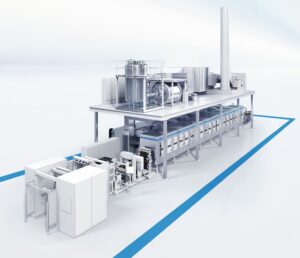
The scrap rates we see in Asia or in some facilities in Europe and America are still far too high.
As a leading supplier of battery manufacturing equipment, we can address the challenges around scrap through with a comprehensive range of solutions.
When choosing equipment for electrode production, it is important to consider the expertise required for both the coating and drying processes.
That is basically our business, which includes dealing with harmful solvents that must be processed and filtered in accordance with local regulations.
We offer comprehensive solutions for electrode production through seamless integration of technologies and interfaces through a system management mindset.
We don’t just install equipment and leave.
That’s a difference how we have recovered with a system management system mindset and system understanding of the complete, comprehensive system.
Our turnkey approach enables us to overcome initial challenges and deliver benefits to the customer, including processes that are designed to perfectly fit together.
As part of the process, we provide training and service to ensure smooth production startups.
In comparison, the main challenge we see in Europe and America when manufacturers simply buy a bunch of mainly standard machines, is that they have significant issues to get the plant up and running to integrate the whole system.
AI: What is the next innovation leap in electrode production.
Schmüser: From our perspective, there are two focus topics:
The first is to further develop sustainable and alternative drying technologies because the process consumes a lot of energy.
In particular, we see significant potential in laser drying of wet coated electrodes.
One possibility is to use the laser in combination with infrared drying.
Laser drying plays a role in conventional convection dryers by making it possible to achieve high energy density and heating rates, resulting in greatly improved energy efficiency.
That is the goal. Additionally, the process can be controlled very quickly.
When you dry faster and more efficiently you can increase output or reduce the carbon footprint.
However, the main trend is towards dry coating, which will replace a large percentage of wet coating.
We are working heavily on solutions to fine-tune the processes for dry coating.
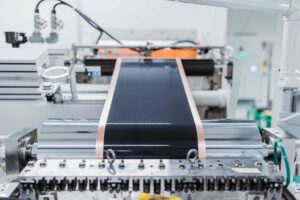
Initial pilot tests have proven that the technology works.
The challenge is to scale the technology up by designing the equipment needed for mass production.
Dürr is taking big steps in this direction, so stay tuned.
AI: What was the goal of the alliance of Dürr, GROB and Manz?
Schmüser: The goal is to establish a European supply chain for production technology for battery cell manufacturing by addressing the pain points and battery production and jointly develop solutions to overcome them.
The Alliance is an end-to-end solution provider with aligned interfaces for both hardware and software.
With a combination of the processes of manufacturing no half are three companies during all months.
On the one side with our comprehensive digitalization competencies, and on the other side, we deliver real customer benefits such as shorten ramp up times higher or OEE and yield and significantly less scrap rates.
That’s the approach to provide a complete and optimized system.
AI: How do the combined capabilities of the partnership create a unique selling point for lithium-ion battery production?
Schmüser: All three companies are well established suppliers and partners in their markets.
We are committed to highest quality standards reliability and service.
By joining forces, we cover nearly the entire value chain of battery production.
Our customers benefit by dealing with a single entity rather than multiple and complex relationships, which often result in delays and cost overruns.
Customers benefit from our complementary product portfolios and our proven project management experience with big projects.
So, we are not just equipment suppliers, we provide appropriate support for every stage of the project from the initial planning to start of production.
Through our global network the three companies can offer 24/7 local support and training services wherever necessary, right from the start to the ramping up of production.
AI: What is next for Dürr Systems?
Schmüser: I firmly believe that close collaboration between the OEMs, battery manufacturers and suppliers of equipment is essential.
Only by working together we can jointly develop solutions that address the current pain points we are facing as well as generate innovations that will drive our industry forward.
By ensuring that the process product development teams and equipment suppliers work seamlessly together we can achieve the kinds of innovations that will set us apart from our competitors.
However, it is not enough to focus solely on the manufacturing process.
We must also embrace digitalization software and use it to support our physical processes.
Doing so will not only enable us to optimize our operations but will also create new opportunities for growth and efficiency.
Another critical focus area is our interface with complex factory systems that consist of various equipment suppliers, logistics, building functions, and organizations to ensure that they are well aligned to achieve increased efficiency, quality, and yield.
Dürr will be at the Battery Show Europe, Stuttgart 18-20 June 2024.
You will find them in Hall 10 Booth H40.
Please visit to learn more about Dürr & battery production.









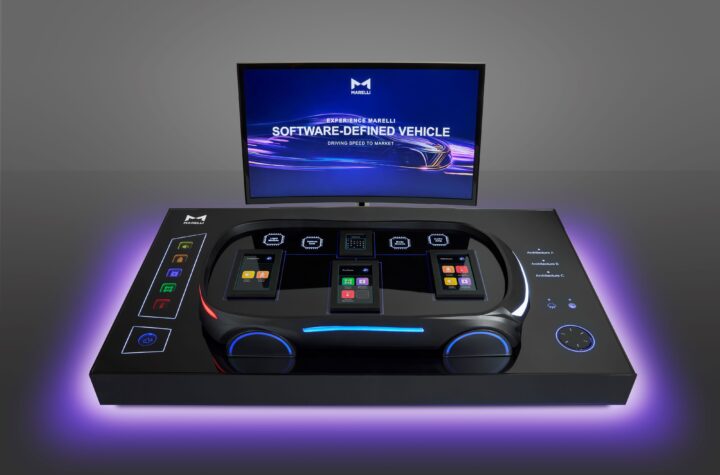
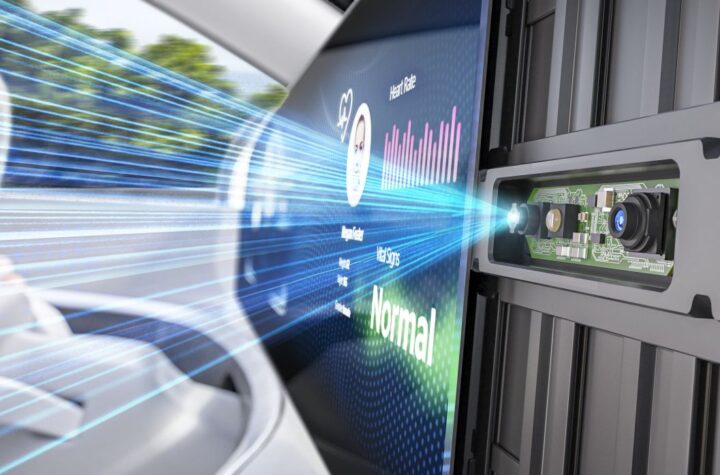
More Stories
Marelli focuses on Software-Defined Vehicle evolution at Auto Shanghai 2025, introducing the new ProZone zone control unit
Will Cars Function Like Smartwatches in the Future?
Marelli to Showcase Latest “Speed-to-Market” Innovations at Auto Shanghai 2025